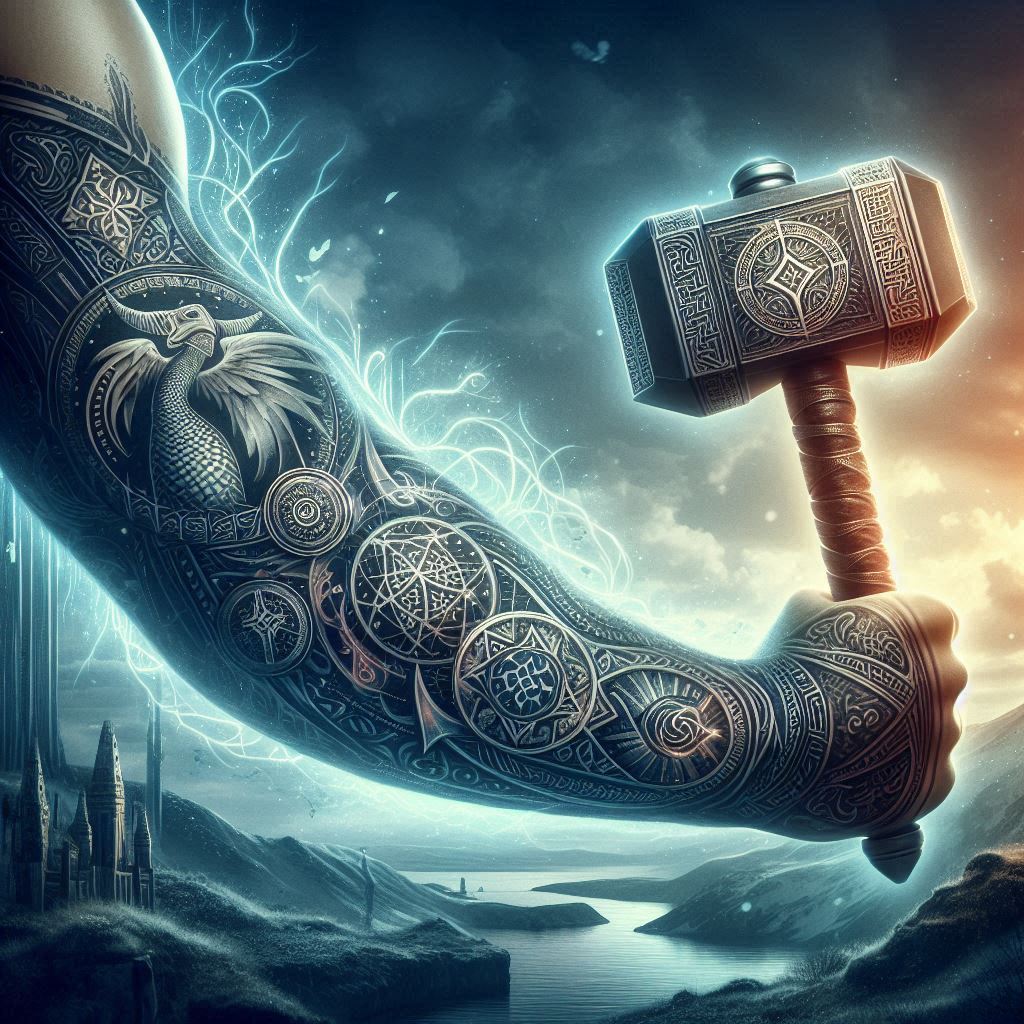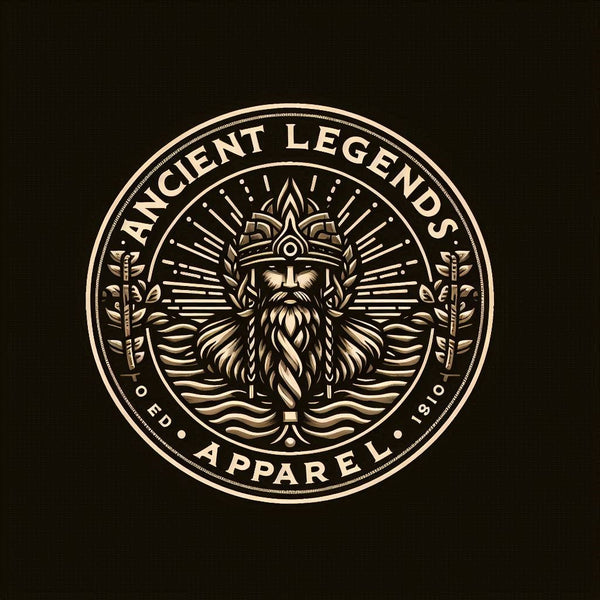
The Art of Mythological Tattoos: From Vikings to Greek Legends
Karl FinnbogasonShare
Tattoos have long been a form of self-expression, storytelling, and identity. Among the most popular and timeless tattoo themes are mythological symbols, gods, and legendary creatures. From the battle-hardened warriors of Viking lore to the divine figures of Greek mythology, mythological tattoos connect people with powerful narratives of strength, wisdom, protection, and destiny.
Whether worn as an emblem of heritage, a tribute to the gods, or a reminder of one’s inner warrior spirit, mythological tattoos continue to inspire tattoo enthusiasts around the world.
Let’s explore the origins, meanings, and significance of these ancient designs and their lasting impact on modern tattoo art.
The Legacy of Viking Tattoos: Runes, Gods, and Symbols of Power
The Vikings were fierce seafarers and warriors who lived during the Scandinavian Viking Age (793–1066 AD). Though there is little concrete evidence of them having tattoos, many scholars believe they used body art to showcase their strength, lineage, and allegiance to Norse gods. Viking-themed tattoos today reflect this warrior spirit and deep connection to mythology.
Popular Viking Tattoo Symbols and Their Meanings
- Mjölnir (Thor’s Hammer): A symbol of strength, protection, and divine power, Mjölnir is one of the most widely recognized Viking tattoo designs. It represents Thor, the god of thunder, who safeguarded both gods and humans from chaos and destruction.
- Vegvisir (Viking Compass): This rune-based symbol is known as the "Pathfinder" or "That Which Shows the Way." It was believed to guide warriors and sailors safely through rough waters and storms.
- The Valknut (Odin’s Knot): A triangular symbol associated with Odin, the Allfather, representing warriors who died honorably in battle and were chosen to enter Valhalla.
- Yggdrasil (The World Tree): A representation of the cosmic structure in Norse mythology, Yggdrasil connects the nine realms and symbolizes life, growth, and interconnectedness.
- Runes: Vikings used runes not just for writing but also for divination and magic. Many people today get rune tattoos to represent personal strength, wisdom, or destiny.
Greek Mythology Tattoos: Gods, Heroes, and Legendary Creatures
Greek mythology has provided some of the most iconic symbols in tattoo culture. With gods known for their power, intelligence, and influence over human fate, Greek mythological tattoos offer a connection to history and timeless narratives.
Popular Greek Mythology Tattoo Designs
- Zeus: The king of the gods, often depicted with a thunderbolt, represents leadership, power, and justice.
- Poseidon: The god of the sea, usually shown with a trident, symbolizes strength, unpredictability, and the forces of nature.
- Athena: The goddess of wisdom and war strategy, associated with the owl and the olive tree, represents intellect, strategy, and victory.
- Medusa: A figure of both beauty and horror, Medusa’s gaze could turn men to stone. A Medusa tattoo symbolizes female power, resilience, and protection from evil.
- The Phoenix: Although also found in Egyptian mythology, the phoenix, a bird that rises from its ashes, is a symbol of rebirth, transformation, and immortality.
- The Minotaur: A creature with the body of a man and the head of a bull, representing strength, power, and overcoming one’s personal labyrinth or struggles.
Roman Mythology and Its Influence on Tattoos
Roman mythology, closely tied to Greek mythology, features gods and symbols that remain popular in tattoo culture. Many Roman warriors were believed to have body markings that signified their devotion to the gods or their status in battle.
Common Roman Mythology Tattoos
- Mars: The god of war, representing aggression, courage, and military strength.
- Jupiter: Equivalent to Zeus, representing supreme power and justice.
- SPQR: An acronym for Senatus Populusque Romanus (The Senate and People of Rome), a powerful symbol of Roman heritage and strength.
- The Roman Eagle: A sign of military power, used as the emblem of Roman legions.
- Gladiators: Many tattoo enthusiasts choose gladiator designs to symbolize resilience, fearlessness, and the will to fight.
Celtic and Other Mythological Tattoos
Apart from Norse, Greek, and Roman mythology, many tattoo designs draw inspiration from Celtic, Egyptian, and other ancient mythologies.
Celtic Mythology Tattoos
- Triskelion: A triple spiral symbolizing motion, progress, and the cycles of life.
- Celtic Knots: Represent eternity and interconnectedness.
- The Cernunnos: The Celtic god of nature, fertility, and the wild.
Egyptian Mythology Tattoos
- The Eye of Horus: A symbol of protection and divine power.
- Anubis: The jackal-headed god associated with the afterlife and the guardian of souls.
- Ra: The sun god, representing creation and cosmic balance.
The Modern Appeal of Mythological Tattoos
So why do people continue to get mythological tattoos today? These tattoos serve as more than just artistic expressions; they connect individuals with deep-rooted symbolism, history, and personal meaning.
Reasons People Choose Mythological Tattoos:
- Cultural Heritage: Many people use tattoos to honor their ancestry, be it Norse, Greek, Roman, or Celtic.
- Personal Empowerment: Symbols like the Valknut, Mjölnir, and Medusa reflect strength, resilience, and defiance against challenges.
- Artistic Beauty: Mythological designs, often intricate and deeply symbolic, make for visually stunning tattoo pieces.
- Storytelling: Each mythological figure represents a narrative of triumph, wisdom, or transformation, making tattoos an expression of personal journeys.
A Timeless Connection to the Gods and Legends
The art of mythological tattoos bridges the ancient and the modern, keeping the legacies of legendary gods, creatures, and symbols alive. Whether it's a Viking warrior marking their allegiance to Odin or a modern individual channeling the wisdom of Athena, these tattoos serve as powerful reminders of our connection to mythology.
From detailed sleeves depicting legendary battles to minimalist rune tattoos signifying fate, mythology continues to be a powerful source of inspiration for tattoo art. It is a timeless testament to the enduring power of myths, the strength they represent, and the way they shape personal and cultural identity.
Whether you are drawn to Norse runes, Greek gods, or the eternal phoenix, mythological tattoos carry deep meaning, making them more than just body art—they are living legends inked into the skin.
